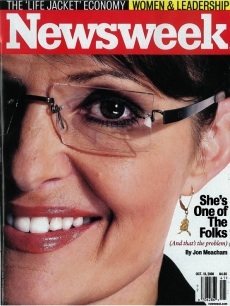The Politics of Headshots
 Last week, Fox News set off a short-lived controversy when it attacked Newsweek for not retouching the magazine's larger-than-life cover photo of Sarah Palin. Calling the headshot "ridiculously unfair to her," anchor Megyn Kelly declared that "any respectable magazine should be doing a little retouching."
Last week, Fox News set off a short-lived controversy when it attacked Newsweek for not retouching the magazine's larger-than-life cover photo of Sarah Palin. Calling the headshot "ridiculously unfair to her," anchor Megyn Kelly declared that "any respectable magazine should be doing a little retouching."
Demanding that a news magazine manipulate photos in order to remain "respectable" may seem odd, all the more so since Governor Palin looks quite attractive in the photograph. But the criticism reveals more than ratings-plumping partisan grievance. In an image-savvy culture, we're increasingly forced to consider just what constitutes a valid portrait. The way most of us instinctively answer the question demonstrates the difference between objectivity and truth.
Consider the apolitical act of selecting a personal headshot: a bridal photo, a website image, an author portrait. You don't just face the camera and accept the first photo that come out. That's for driver's licenses, mug shots, and security badges — the ID photos most people find not only embarrassing but somehow untrue. At the very least, you want to choose a shot where your eyes are open, your smile looks genuine, and your cowlick is under control.
If strangers' snap judgments matter, you go for a bit more artifice. Take an attractive single friend of mine. When she moved to Los Angeles, she signed up with an online dating service, using a handy snapshot to illustrate her profile. She got no inquiries. Then she hired one of the many local photographers who specialize in actors' headshots. With exactly the same profile information but a more professional photo, my friend was suddenly inundated with emails from prospective dates. She didn't even use retouching or special makeup. The difference she says, "was the lighting, the camera angles, plus the sheer volume of shots." She had hundreds to choose from.
Partisans demand that magazine portraits glamorize their heroes for the same reason my friend hired a professional photographer. Humans seem hard-wired to assume that good-looking means good and, conversely, to equate physical flaws with character flaws. We may preach that beauty is skin deep, but we're equally certain that portraits "reveal character." In a media culture, we not only judge strangers by how they look but by the images of how they look. So we want attractive pictures of our heroes and repulsive images of our enemies.